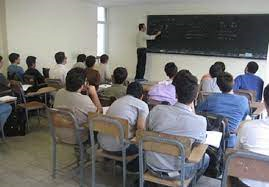The teacher and the student have several duties and rights on each other, which can be divided into two categories:

What rights do teachers and students have towards each other?
The teacher and the student have several duties and rights on each other, which can be divided into two categories:
1-The teacher's duties towards the student, which include moral-educational duties and scientific-educational duties.
The student's duties towards the teacher and professor are like honoring the teacher and glorifying the position of knowledge, being humble before him, etc.
The duties and rights of the teacher over the student and vice versa can be divided into two parts:
First: The duties of the teacher towards the student
The duties of the teacher towards the student are classified in two parts:
A) Moral-educational duties
The teacher's moral-educational duties towards the students are:
1-Kindness and affection towards the student.
2-Humility and gentleness towards students.
3- Checking the condition of students
4- Knowing the name and details of the student.
5- Respecting the personality of the student and the importance of his thoughts.
6- Observance of equality in attention and love to students.
7- Paying attention to students according to their academic history and paying attention to their merits based on education.
8- Introducing qualified teachers to students.
9- Creating a sense of responsibility and discipline in students.
10-Friendship and tolerance with the student and attention to his questions.
11- Kindness towards new students.
12- Warning of slips and teaching mistakes before the end of the lesson.
13- Lingering in the meeting after the lesson is over.
14-vAppointing observer and representative for students.
15- Ending lessons with moral advice and prayer.[1]
b) Scientific and educational duties
The scientific and educational duties of the teacher towards the student are:
1- Step by step effort towards the progress of students
2- Creating enthusiasm and attachment to science and knowledge in students.
3- Trying to make students understand the material according to the student's talent.
3- Encouraging students to engage in scientific work and insisting on repeating lessons
4- Designing precise issues and asking students their problems
6- Using the best rules and methods of teaching and understanding to students.
7- Observance of logical order in teaching science and knowledge
8- Adhering to moderation and brevity in expressing and explaining content.
9- Paying attention to the proper atmosphere of the class (away from any disturbing factors).
10- Paying attention to the voice and the way of expression during teaching.
Second: The teacher's rights over the student
1- Honoring the teacher and glorifying the authority of science and knowledge.
2-Humility before the teacher.
3- Thanksgiving against the teacher's guidance and warnings.
4- Tolerating possible harshness of the teacher.
5- Waiting for the teacher and honoring his presence.
6- Not disturbing the teacher's work.
7- Not disturbing the teacher's rest.
8- Not imposing teaching time on the teacher.
9- Sitting politely in front of the teacher.
10- Taking care of your moods and behavior in the presence of the teacher.
11- Speaking politely to the teacher
12- Compensating and providing for the shortcomings of the teacher's speech with subtle hints.
13- Concentration and careful listening to the teacher's words.
14- Not repeating exhausting and time-wasting questions.
15- Timely question from the teacher.
16- Not avoiding questions because of shame and modesty.
17- The student's courage in admitting not understanding the scientific material.
18- Protecting the teacher's privacy at all times.
19- Avoiding any unjust accusations to the teacher.
20- Covering the teacher's faults and revealing his merits and virtues.
21- Observance of silence in the lesson assembly .[2]

References
[1]- Shahid Thani, Zain al-Din bin Ali, Muniya al-Murid , researcher, corrector, Mokhtari, Reza, p. 190, Qom, School of Islamic Media, first edition, 1409 AH.
[2]- For more information,refer to the book " Ethics of Education in Islam " translated by Dr. Seyyed Mohammad Baqer Hojjati.



